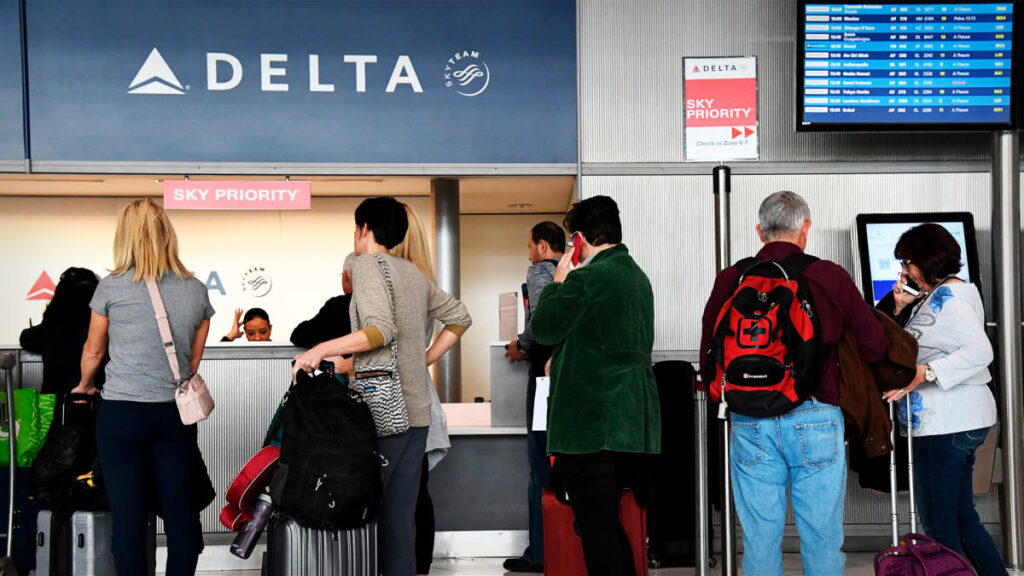In recent months, a number of airline disasters and near-disasters have had passengers worried about aircraft safety.
The good news is that while it seems as if the number of incidents is rising, air travel remains a generally safe way to travel, with the vast majority of flyers getting to their destination safely.
That does not mean there are never problems, though.
Delta Air Lines has actually been dealing with one frightening issue related to its planes’ engines. Fox News reported that it has worked on making fixes since 2022 and is now close to completing the process.
Unfortunately, the issue plaguing these Delta planes is one that several other airlines are facing. It is a serious source of concern that could put the health and safety of travelers in jeopardy for an unexpected reason.
Image source: Guay/AFP via Getty Images
Delta Air Lines is replacing engines for this reason
According to a Wall Street Journal news article on the issue with Delta Air Lines’ engines, the airline is currently in the process of replacing the auxiliary power unit, a third engine located on the back of planes that generates electricity and pumps air into the cockpit.
The APU works when the two primary engines don’t run, such as when a plane is taxiing. Unfortunately, the APU has been identified by Airbus as a top cause of toxic fume events on the Airbus A320 family of planes.
Delta operates 310 of these planes, including 76 of the latest models. Since the engine is such a major source of toxic fume events, the carrier is upgrading the engines.
Why faulty Delta Air Lines engines pose toxic fume risk
According to the WJ’s report, Airbus discovered that many toxic fume events on the A320 occurred because leaks entered the APU from an air inlet on the belly of the aircraft. Leaks can also occur within the jet engine itself.
Typically, what happens is that oil leaks into either the engine or the compression chamber of the APU. Extreme heats cause it to vaporize, releasing unknown and potentially dangerous quantities of neurotoxins and chemicals into the air in the cabin and cockpit.
More Airlines:
- Southwest Airlines adds another new rule making travel harder
- Airline cuts last flight into this US city, refunds available
- TSA issues stern warning on item over 13 million Americans use
- Spirit Airlines cuts more flights and jobs amid second bankruptcy
These leaks can contaminate the air on planes, even in situations when the APU is not actively running. And APUs can be more likely to leak as they age, increasing the risk of toxic fume events.
“Symptoms frequently reported by aircrew following a fume event include eye, nose, throat, and airway irritation, nausea, headaches, dizziness, cognitive impairment, and fatigue,” according to a 2022 article in the journal Advances in Neurotoxicology.
“Occasionally aircrew, including pilots, have been completely incapacitated by fumes and were forced to perform emergency landings,” the article adds.
Some plane passengers have already been sickened by fumes
Unfortunately, some airline passengers have also become ill from toxic fume incidents. Fox News highlighted several issues that have occurred, stating:
Toxic air events for Delta and other U.S. carriers have surged in recent years, especially on Airbus 320-family jets… The fumes have been linked to brain injuries and other health problems among crew members and passengers and have caused diverted and aborted flights. Some pilots even needed oxygen masks.
Toxic air events are not just a Delta Air Lines problem
Delta Air Lines has been among the most proactive airlines in addressing the problem, as it began replacing engines in 2022, although it did not previously disclose these ongoing efforts.
The Wall Street Journal said other carriers have also seen a surge in toxic fume issues across the A320 family of aircraft. Fox News even reported one JetBlue flight attendant had developed a traumatic brain injury after she inhaled toxic fumes on a flight to Puerto Rico.
Concerned passengers should note that Delta Air Lines has indicated it will do what it takes to try to improve air safety. WSJ indicated that a Delta spokesperson said:
Nothing is more important than the safety of our customers and people.
Related: TSA warns against flying with item used by over 60% of Americans




